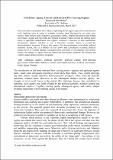Files in this item
Conclusion : agency, context and emergent post-uprising regimes
Item metadata
| dc.contributor.author | Hinnebusch, Raymond | |
| dc.date.accessioned | 2016-09-24T23:34:08Z | |
| dc.date.available | 2016-09-24T23:34:08Z | |
| dc.date.issued | 2015 | |
| dc.identifier | 162705004 | |
| dc.identifier | 5cebfe6d-ba29-4229-a986-241f0c6f819e | |
| dc.identifier | 84929023568 | |
| dc.identifier | 000353453000009 | |
| dc.identifier.citation | Hinnebusch , R 2015 , ' Conclusion : agency, context and emergent post-uprising regimes ' , Democratization , vol. 22 , no. 2 , pp. 358-374 . https://doi.org/10.1080/13510347.2015.1010815 | en |
| dc.identifier.issn | 1351-0347 | |
| dc.identifier.other | ORCID: /0000-0001-5800-6606/work/60630157 | |
| dc.identifier.uri | https://hdl.handle.net/10023/9548 | |
| dc.description.abstract | This conclusion summarizes the evidence explaining the divergent trajectories taken by post Arab uprising states in terms of multiple variables, each illustrated by an iconic case, namely: State Failure and Competitive governance (Syria), Regime Restoration and Hybrid Governance (Egypt) and Polyarchic Governance (Tunisia). Factors include the starting point: levels of opposition mobilization and regimes' resilience – a function of their patrimonial-bureaucratic balance; whether or not a transition coalition forms is crucial for democratization prospects. Context also matters for democratization, particularly political economic factors, such as a balance of class power and a productive economy; political culture (level of societal identity cleavages) and a minimum of international intervention. Finally, the balance of agency between democracy movements, Islamists, the military and workers shapes democratization prospects. | |
| dc.format.extent | 240903 | |
| dc.language.iso | eng | |
| dc.relation.ispartof | Democratization | en |
| dc.subject | Arab Uprisings | en |
| dc.subject | Agency | en |
| dc.subject | Political economy | en |
| dc.subject | Political culture | en |
| dc.subject | Post-Uprising governance | en |
| dc.subject | Failed states | en |
| dc.subject | Islamists | en |
| dc.subject | Social movements | en |
| dc.subject | Military | en |
| dc.subject | Workers movements | en |
| dc.subject | Syria | en |
| dc.subject | Egypt | en |
| dc.subject | Tunisia | en |
| dc.subject | JZ International relations | en |
| dc.subject | Social Sciences(all) | en |
| dc.subject.lcc | JZ | en |
| dc.title | Conclusion : agency, context and emergent post-uprising regimes | en |
| dc.type | Journal article | en |
| dc.contributor.institution | University of St Andrews. School of International Relations | en |
| dc.identifier.doi | https://doi.org/10.1080/13510347.2015.1010815 | |
| dc.description.status | Peer reviewed | en |
| dc.date.embargoedUntil | 2016-09-24 |
This item appears in the following Collection(s)
Items in the St Andrews Research Repository are protected by copyright, with all rights reserved, unless otherwise indicated.

